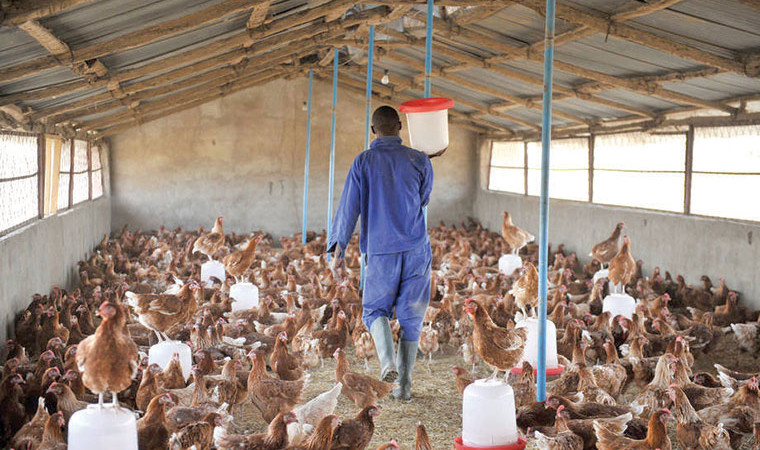

Humans can contract poultry (zoonotic or vector-borne) diseases through contact with an animal, its bodily fluids, its infected waste or its living environment; by contact with water or soil contaminated by infected animal waste; by eating meat from infected animals or eating food such as fruits and vegetables that have been contaminated by infected animal waste; or through vectors, such from infected animals to humans via mosquitoes, fleas or ticks. Following are some zoonoses related to birds and poultry:
Influenza (including H5N1 and H1N1)
vian (bird) flu is caused by influenza A avian viruses that occur naturally among birds. Wild birds worldwide carry avian influenza viruses in their intestines, but usually do not get sick from them. However, avian influenza is very contagious among birds and can be deadly for some domesticated birds, including chickens, ducks, and turkeys. Infected birds shed influenza virus in their saliva, nasal secretions, and feces.
Domesticated birds may become infected with avian influenza virus through direct contact with infected waterfowl or other infected poultry, or through contact with surfaces (such as dirt or cages) or materials (such as water or feed) that have been contaminated with the virus. Contact with infected fecal material is the most common means of bird-to-bird transmission. Vaccines and treatments are in research and development. The best prevention is to keep pet birds indoors and don’t allow them to come into contact with other birds. Worldwide, there have been numerous human deaths attributed to close contact infected birds and poultry.
Salmonellosis
Salmonellosis is a bacterial disease. Typical symptoms include diarrhea, fever, and stomach pain that starts 1 to 3 days after infection. These symptoms usually go away after 1 week. In some cases, medical attention is required because the diarrhea is severe or the infection has affected other organs. Usually, people get salmonellosis by eating contaminated food, such as chicken or eggs. However, many different species of animals, including poultry, reptiles, amphibians, and farm animals can carry Salmonella and pass it in their feces. Baby chicks and ducklings are especially likely to pass Salmonella to people. Parents and househelps should be aware that children under 5 years old should not handle baby chicks and ducklings, as salmonellosis can be very severe in young children.
To reduce infection risks, you should:
Wash your hands thoroughly with soap and water after touching, feeding or caring for your bird, poultry, reptiles and other pets, and especially after cleaning up their waste and habitats.
Children under 5 years of age should handle or pet any animal, including poultry, reptiles, amphibians and hedgehogs, only with parental supervision and everyone should wash their hands thoroughly afterwards.
Keep birds, poultry, reptiles and amphibians in a species-appropriate habitat. To reduce the risk of illness, do not let these type of animals roam around your home.
Wash your hands after contact with farm animals such as cattle, sheep, pigs and goats as these animals can also transmit Salmonella.
Clean your pet or animal’s food and water dishes in a separate sink or tub, not in the kitchen sink or bathtub.
Cook meat, poultry and eggs thoroughly. Wash fruits and vegetables before eating. Clean food preparation surfaces regularly. After preparing raw foods such as fish, meat or poultry, wash your hands, utensils and cutting boards before you start handling other foods.
Avoiding bathing infants in the kitchen sink.
Prevention
Regular veterinary care is important for the health of every animal. Your veterinarian can recommend a health care protocol to keep your bird or poultry safe from infectious diseases.
The best way to protect yourself from these zoonotic diseases is to practice good hygiene after handling an animal or its waste. Wash your hands thoroughly with hot, soapy water. If you have any questions about these diseases or concerns about your pet’s health, please consult your Vet. If you have concerns about your health, please seek medical attention from your health care provider.
 Contact Jaguza Support
Contact Jaguza Support